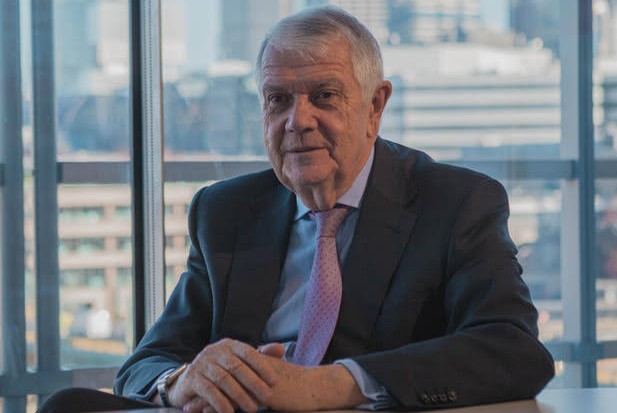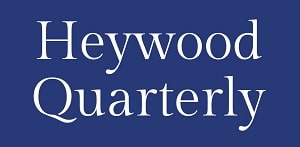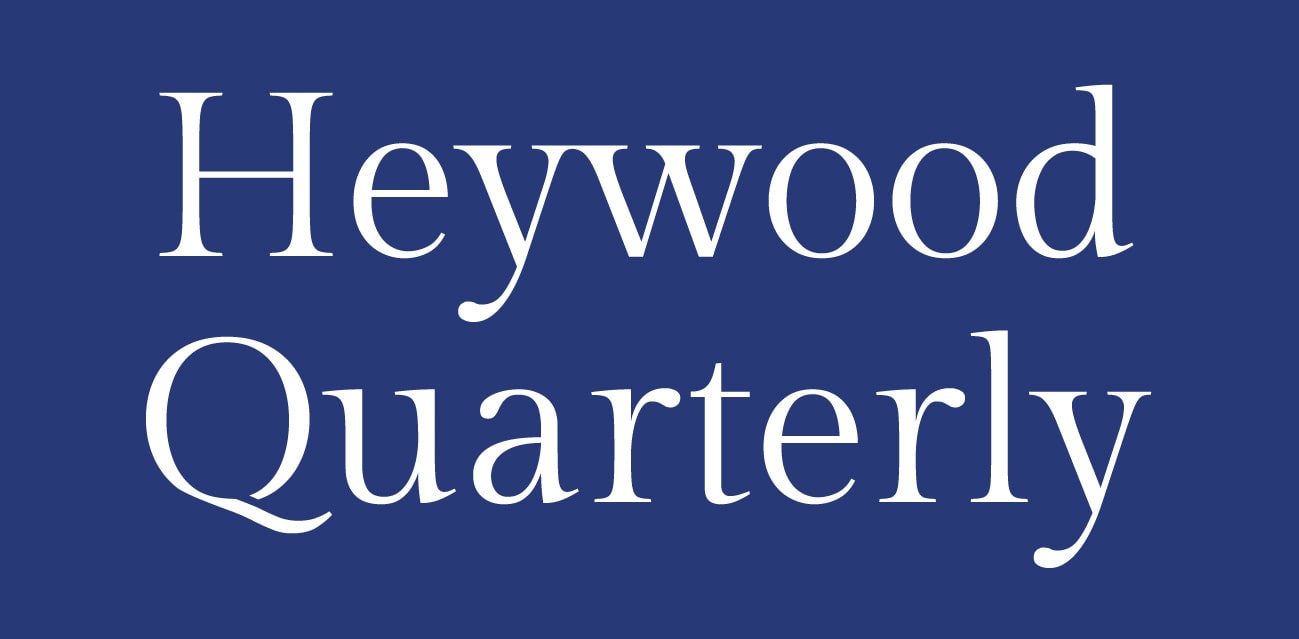In this summary of an extensive discussion in the autumn, Peter McDonald talks to the former Permanent Secretary to the Treasury about responding to crises, working with Ministers, solving problems and other reflections from a multifaceted career
Terry Burns was only just on time for our meeting, but he had good reason: before he left home, he had been asked to provide his recollection of the period in the early 1990s which preceded reforms to the Royal Family’s financial arrangements. It was an apt starting point for our wide-ranging conversation, one that would span Terry’s nearly fifty years of public service and the lessons he has gathered along the way.
The events of 1992 work well for a first subject. In September of that year, the UK was famously forced to withdraw from the European Exchange Rate Mechanism (ERM). The story of Black Wednesday – with interest rates changing by the hour – has been well told elsewhere, and was a severe blow to the government and the Treasury. But what is less well noted is how quickly the Treasury was able to put in place an alternative monetary framework. Then, only two months later, something else went up in flames: Windsor Castle. Again, the images are seared in our memories. But what is less well remembered is that important changes to the Royal finances were announced a short time later.
In both cases, Terry was at the heart of events and decisions. His chief reflection is one of readiness – not necessarily of the immediate handling of crises in the heat of the moment (who could prepare for that?), but of being able to make the most of the aftermath. Reflecting on the exit from ERM, “people were amazed” that within a few short weeks there was an entirely new monetary system in place, with an inflation target, Bank of England reporting and a regular drumbeat of governance. This was hardly conceived on the spot; instead, it was “the product of work we had done over the previous few years.” Similarly, the initiative by the Queen to make a tax contribution on her income had been under discussion for some time before an ultimate decision was taken.
“In the repeat business that the Treasury is in,” Terry reflects, “a piece of work is rarely wasted.” The art is having the groundwork in place when circumstances shift. “We always had lots of semi-finished ideas – like dishes kept warm and ready in a kitchen”, he recalls. “You just have to be patient.”
e says, so the job of the civil servant is to help Ministers gain full use of the system and its levers.

Joining government
Terry’s background was firmly rooted in academia before he entered the world of government. As an economist at the London Business School, he had spent over a decade teaching and building computer models of the UK economy. When the opportunity arose in January 1980, he made the leap into public service, joining the Treasury as Chief Economic Adviser at the age of 35 – much younger than his senior peers.
“The subject matter was largely familiar,” says Terry, “but the processes and institutional arrangements were not – the way of working with Ministers, the handling of submissions, when to add to your team’s work and when to let them take the lead.” Economic conditions were far from benign, so this was no gentle induction; the very next year, Geoffrey Howe’s 1981 Budget famously provoked a letter from 364 dissenting economists. Amidst it all, Terry remembers his regular visits to Downing Street: “On one occasion, I was summoned down to talk to the Prime Minister about economic policy before presenting directly to the full Cabinet.” The experience was both “surreal and instructive.”
All in all, the period allowed him to learn quickly how to communicate his expertise in a way that helped Ministers frame decisions and craft the public arguments they wanted to put forward. It also laid the foundation for his approach to public service: a blend of intellectual rigour, humility and adaptability. In particular, he learned not only the art of advising, but also of understanding the needs and pressures of those he served.
Trust and challenge
Terry went on to hone his approach to building relationships and working productively with a succession of Chancellors of the Exchequer. “We did not always agree by any stretch of the imagination,” he recalls, but over time he developed a sense of “what kind of licence I had to disagree.”
There are, of course, prerequisites to gaining such a licence. Above all, “the most important thing in dealing with Ministers is them believing that you truly want them to be successful.” In contrast, it is not about showing how clever you are, or pushing an agenda. Terry believes the civil servant’s role is to support Ministers in reaching the best possible decisions, even if that involves providing challenge before those decisions are made (but never after). “We had one or two people at the Treasury who could always set out a list of reasons why something would not work.” While some Ministers found it frustrating, the best ones understood the value. A confident Minister, Terry explains, is one who “listens to the challenge because those providing it are in effect doing the checking.” His advice is to find a space for these people to sit around the table.
Of course, no amount of interrogation can entirely protect against unforeseen consequences, which are inevitable in the complex work of government. But you can “never, ever afford” to say ‘I told you so’ if things go wrong. “It is a surefire way to kill the relationship,” he explains. And if a Minister proceeds with something counter to advice? “You seek to make it work regardless,” he says plainly.
All of the above assumes Ministers, officials and the system of government are each known quantities. But that is not true during transitions – “these are much harder”. Here, new governments often want to continue working just as they did in opposition. After all, they have been elected, an apparent sign of the effectiveness of their operation. But this empirical justification does not necessarily reflect the complexities of gaining office. All the while, “officials may be trying to squeeze them into a ‘traditional’ method of working.”
“A transition is a natural phase,” reflects Terry. While it cannot be bypassed, it can be shortened with attentive and patient support. For those officials who excel at it, it is an opportunity to forge strong relationships for the future and help Ministers understand how they can best operate within the actual machinery of government. “The reality is that the process of governing is very difficult,” he says, so the job of the civil servant is to help Ministers gain full use of the system and its levers.

Terry on a fact finding trip with Jeremy Heywood in Asia, January 1994.
Specialising in people
Of course, the Civil Service itself has a vital role to play in designing and operating the best possible system. Terry has long held that this is as much about people as the classic ‘machinery’ of government – his starting point is that departments must have clear purpose, be rewarding places to work and encourage good careers. Reflecting on his early years as Permanent Secretary (which he became in 1991 after eleven years as Chief Economic Adviser), he observes that the Treasury of the day needed to evolve with the times, just as many private sector bodies had done over a similar period. Without change, it was at risk of being inward-looking, insufficiently empowering of its staff and weak on people management. With this in mind, he commenced a strategic review of the department’s role, organisation and culture, led by a certain Jeremy Heywood (then emerging from a long stint as Principal Private Secretary to Norman Lamont).
The 1994 ‘Fundamental Expenditure Review’ is still referenced in Whitehall today, particularly in economics circles, and notably in respect of a key outcome to integrate specialists – particularly economists – across different Treasury teams rather than keeping them in silos. This was about getting them “closer to the action”, the goal being to enrich the policy-making process with rigorous, analytical perspectives. Indeed, Terry found that “specialists often make the best generalists – and they ask the best questions.”
“We sought to break down the barrier between which jobs people could do, who got to meetings and who was listened to,” he recalls. This was very different from the Treasury he joined in the 1980s, when economists fed into the generalists who usually led advice to Ministers – ‘specialists on tap, not on top’, was the adage. Another change he championed was to take out layers of the organisation to reduce unnecessary oversight and bring those who did the actual work closer to decision-makers. “We worked very hard to make sure that the more junior people were at meetings with Ministers,” Terry notes.
Open door policy
Terry also recognised that to drive meaningful change, the Treasury needed to become more outward-facing and open to ideas from beyond its ivory tower. “The Treasury’s people were not always as curious about what other people were arguing as they might have been,” Terry reflects. Both he and Jeremy saw this as the route to driving innovation.
But what is ‘innovation’, this much bandied term of civil service reform? Terry begins with the negative: “it is not just inventing new ideas.” Instead, “it is just as much about how you use the ideas that other people have developed” – a distinction that reflects his pragmatic approach to government. This links back to being able to respond to the issues of the day. “If you just turn your back on the things that other people say and think that the only source of any ideas are within your own group, then you are in trouble, because you will not be prepared for the moments when the tide changes.”
In Terry’s view, a strong civil service balances the weight of its institutional knowledge with an openness to new perspectives. “Innovation is about curiosity – being open-minded to the outside world,” he explains. “One of the things that Jeremy was very good at was picking up ideas, looking at what other people were doing and asking the question, ‘does this have relevance here?’” Terry considers this a mindset among younger generations especially, which makes it all the more important to build organisations that encourage them.
Terry also emphasises that innovation requires the time and space to incubate. Now more than ever, governments face a relentless cycle of demands, which can crowd out the opportunity for reflective thought. Thirty years ago, he recalls his experience of how Ministers and officials would debate ideas at length, whether or not they originally emanated from the Treasury. Time is hard to find, but his advice is to try and find a way to carve out the opportunity to reflect on different approaches, ideally with Ministers. As he found in 1992, it is “immensely valuable”.
The heart of the matter
After he left the Civil Service in 1998, Terry found himself asked to lead myriad external reviews on topics of the day, including financial services legislation, fox hunting, Freedom of Information, the regulation of the BBC, football governance, the size of the House of Lords and transport infrastructure in Wales.
By his own admission, the style of inquiry he developed was deceptively simple. It always began with being forensically clear on the terms of reference and agreeing these explicitly with Ministers at the outset. He would then set out the issues and review the evidence deeply enough to reach a view about the heart of the problem. This analysis would then be subject to consultation, but it had to be “very balanced in terms of views and opinions” to demonstrate fairness and rigour. Only then would recommendations follow, although they would be trialed extensively beforehand.
“Very few of the things I have been engaged in have been black and white,” Terry explains. “They are all things where the arguments are finely balanced, sort of 55 – 45.” Weighing up all sides inevitably leads to carefully-crafted conclusions which can verge on dispassionate understatement. Perhaps most famously, he concluded that hunting with hounds ‘seriously compromised the welfare of the fox’. But it was a review of a highly emotionally-charged topic and was generally welcomed by all ‘sides’ of the debate – a rare feat and a model for future work.
In stark contrast to his self-diagnosed obsession with identifying the source of problems, he cautions against preconceived answers. “It is quite disappointing how many people spend their lives searching for evidence to support the things that they instinctively believe in,” he explains. Instead, civil servants should take an objective stance and always begin with the underlying evidence about how policy is not working effectively. Gaining a comprehensive understanding of the problem and getting people to buy into it may take time, but options and recommendations flow much more easily once the work has been done. “It is not rocket science, but there is value in it,” he says. Indeed, when done well, Terry has often found that the problems almost “answer themselves”.
Some might infer this method is only possible outside government under the banner of an independent review. But Terry does not agree; in fact “you get a lot of cover inside” – there is less need to provide a running commentary or be restricted by a precise remit. The art, therefore, is to create a culture and capability that allows it to happen internally. Relying entirely on specialists outside government (consultants, for example) is “not something I am comfortable with.” He believes it is an expensive way of doing things and does not lend itself to productive internal discourse. Civil servants also need to find a productive way of working with Ministers to show the value from such debate, especially when there is pressure to act in haste.
In the service of others
Over the course of Terry’s career, he has found his skills to be “eminently transferable” between both academia and government, and the public and private sector. Over the last 25 years, he has taken a range of board roles, including as Chair for Santander UK, Marks and Spencer, Welsh Water, the National Lottery Commission, Channel 4 and Ofcom. The experience prompts him to compare the relationship between a senior civil servant and a Minister to that of a Chair and CEO. “The function of a good Chair is to help to make the CEO as successful as possible in implementing the objectives of the Board”, he explains, which is little different from the civil servant’s role in relation to Ministers. In both cases, it is about acting in support of those who ultimately take the day-to-day decisions and are held to account for them.
Building on the theme, he makes a link to his continued backing for the Treasury as an institution. While rarely perceived in this regard, the department is fundamentally in the service of the rest of government. In a world where so many parts of government compete for the same resources, the Treasury must be the “allocation department” on behalf of the Cabinet and with the oversight of the Prime Minister. In his long experience, “it is an organisation that people will always have a go at because of its unique position in our constitution,” but he is clear that any government needs a successful Treasury. “I still feel wholly supportive and invested in both the Treasury and Treasury Ministers – I want them to succeed,” he extols.
The same sentiment applies to the Civil Service in general. While much has changed over his lifetime, he believes the qualities that define a good civil servant remain largely unaltered. “They need to be curious, open, rigorous and care about their people”. Government departments, he argues, are generally in a “repeat business” – what most are engaged in today will be similar to what they are engaged in tomorrow. This is both a comment that recognises path dependency but also supports institutional memory. However, he emphasises that drawing on past experience should not prevent civil servants from being receptive to outside inspiration – reflecting back on innovation, “you also need to balance organisational knowledge with being open to new ideas.”
Being an excellent civil servant is no solo endeavour – the act of striving for the welfare of others is a team sport. His old connections thus endure. Even years after his formal role ended, he remains close with many of his former colleagues, a testament to the strength of bonds forged “working through storms and difficulties.” For Terry, this camaraderie is more than personal; it is a reflection of a public service culture that values people as much as policy.
On that powerful note, I bring our conversation to an end, conscious Terry will want to be just in time for his next appointment – with a past colleague, of course.
Peter McDonald is the Director of Transport and Digital Connectivity in the Welsh Government and is also a member of the Editorial Board of the Heywood Quarterly.





